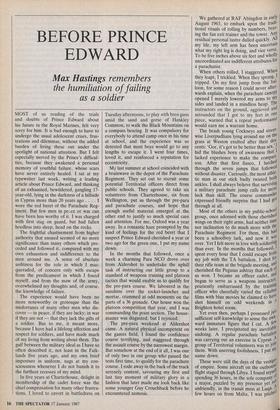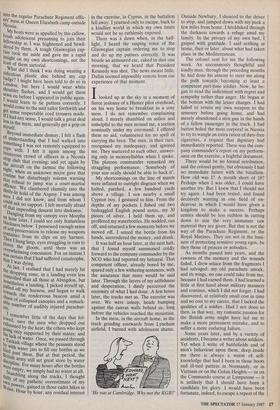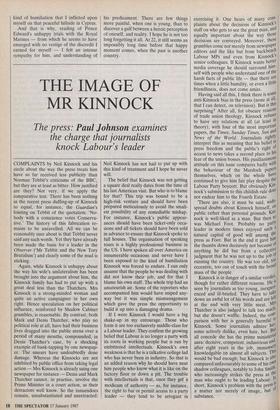BEFORE PRINCE EDWARD
Max Hastings remembers
the humiliation of failing as a soldier
MOST of us reading of the trials and doubts of Prince Edward about his future in the Royal Marines, felt very sorry for him. It is bad enough to have to undergo the usual adolescent crises, frus- trations and dilemmas, without the added burden of living these out under the spotlight of national attention. But I felt especially moved by the Prince's difficul- ties, because they awakened a personal memory of youthful failure, whose scars have never entirely healed. I sat at my typewriter last week, writing a leading article about Prince Edward, and thinking of an exhausted, bewildered, gangling 17- year-old, lying in the darkness of a hillside in Cyprus more than 20 years ago . . . . I wore the red beret of the Parachute Reg- iment. But few men in peace or war can have been less worthy of it. I was charged with first stag on guard, but had fallen heedless into sleep, head on the rocks.
The frightful chastisement from higher authority that ensued seemed of no more significance than many others which pre- ceded and followed it, compared with my own exhaustion and indifference to the men around me. A sense of absolute unfitness for the role in which I mas- queraded, of concern only with escape from the predicament in which I found myself, and from the maw of the army, overwhelmed my thoughts and, of course, the knowledge of failure.
The experience would have been no more noteworthy or grotesque than the misfortunes of many other men who dis- cover — in peace, if they are lucky; in war if they are not — that they lack the gifts of a soldier. But to me, it meant more, because I have had a lifelong affection and respect for soldiers, and have made much of my living from writing about them. The gulf between the military ideal as I have so often described it, not least in the Falk- lands five years ago, and my own brief imposture in uniform, nags at my con- sciousness whenever I do not banish it to the furthest recesses of my mind.
In five years at Charterhouse, delight in membership of the cadet force was the chief compensation for many other frustra- tions. I loved to cavort in battledress on Tuesday afternoons, to play with bren guns amid the sand and gorse of Hankley Common, to walk the Black Mountains on a compass bearing. It was compulsory for everybody to attend camp once in his time at school, and the experience was so detested that most boys would go to any lengths to escape it. I went four times, loved it, and reinforced a reputation for eccentricity.
My last summer at school coincided with a brainwave in the depot of the Parachute Regiment. They set out to recruit some potential Territorial officers direct from public schools. They agreed to take six volunteers from Charterhouse, six from Wellington, put us through the pre-para and parachute courses, and hope that enough useful material emerged at the other end to justify so much special care and attention. For me, Oxford was a year away. In a romantic haze prompted by the kind of feelings for the red beret that I suspect Prince Edward cherished a year or two ago for the green one, I put my name down.
In the months that followed, once a week a charming Para NCO drove over from Aldershot to undertake the uphill task of instructing our little group to a standard of weapons training and platoon tactics that would enable us to qualify for the pre-para course. We laboured in the sunshine over the rocket-launcher and mortar, crammed at odd moments on the parts of a 36 grenade. Our house won the platoon competition that year, and I was commanding the point section. The house- master was disgusted, but I rejoiced.
The pre-para weekend at Aldershot came. A natural physical incompetent on the games field, I found the confidence course terrifying, and staggered through the assault course by the narrowest margin. But somehow at the end of it all, I was one of only two in our group who passed the tests first time, to qualify for the parachute course. I rode away in the back of the truck serenely content, savouring my first and last tiny moment of military glory in a fashion that later made me look back like some younger Guy Crouchback before he encountered nemesis. We gathered at RAF Abingdon in early August 1963, to embark upon the tradi- tional rituals of rolling by numbers, brav- ing the fan exit trainer and the tower. MY residual personal lustre dulled quickly. All my life, my left arm has been uncertain what my right leg is doing, and vice versa. To be five inches above six feet and wholly uncoordinated are indifferent attributes for a parachutist. When others rolled, I staggered. When they leapt, I trickled. When they sprang, tripped. On my first jump from the bal- loon, for some reason I could never after' wards explain, when the parachute canoPY opened I merely lowered my arms to mY sides and landed in a mindless heap. The instructors on the ground, aggrieved and astounded that I got to my feet in one piece, warned that a repeat performance would earn me a warrant home.
The brash young Cockneys and street' wise Liverpudlians lying around me on the grass at Weston exulted after their des- cents: cents: `Gor, it's got to be better than sex. hid the blushes born of awareness that I lacked experience to make the compan: son. After that first fiasco, I lurched through the seven jumps that followed without disaster. Curiously, the most athle- tic man in our stick badly twisted both ankles. I shall always believe that surviving a military parachute jump calls for more luck than skill. The course commander, etpressed friendly surprise that I had go' through at all. Most of the others in my public-school, group, once adorned with those cherished wings on their right arms, had neither time nor inclination to do much more with the, Parachute Regiment. For them, this had been a schoolboy lark, and now it was over. Yet I felt more in love with soldiering than ever. In the months that followed, spent every hour that I could escape Win my job with the TA battalion. I shot for their rifle team at the brigade meeting, and cherished the Pegasus ashtray that each of ,; us won. I became an officer cadet, any began to serve as a weapons instructor, pruriently embarrassed by the training officer who cheerfully varied the syllabus films with blue movies he claimed to have shot himself on odd weekends in 3 Brighton hotel room.
Yet even then, perhaps I possessed J sufficient self-knowledge to sense the avik.: ward immature figure that I cut. A fer weeks later, I precipitated my inevitable undoing. A regular parachute battallo,11 was carrying out an exercise in Cyprus. f' group of Territorial volunteers was to PIP them. With unerring foolishness, I put name down.
These were still the days of the vestiges of empire. Some aircraft on the outboin_A flight staged through Libya. I found m f spending 36 hours, in the sole companY °t a major, puzzled by my presence yet 11° unfriendly, in the transit mess at Lucia. few hours on from Malta, I was pftche into the regular Parachute Regiment offic- ers' mess at Queen Elizabeth camp outside Nicosia.
My hosts were as appalled by this callow, brash adolescent presuming to join their fellowship as I was frightened and bewil- dered by them. A tough Glaswegian cap- tain took me aside and gave me a rapid insight on my own shortcomings, not the least of them sartorial. What did I think I was doing wearing a ridiculous plastic disc behind my cap badge? I might have been told to do so in London, but here I would wear white shoulder flashes, and I would get them sewn on before I appeared in public again. I would learn to tie puttees correctly. I would come to the unit tailor forthwith and get some respectable cord trousers made. If I had any sense, I would talk a great deal less in the mess, and generally get a grip on myself.
Beyond immediate dismay, I felt a flash Of understanding that I had walked into something I was not remotely equipped to cope with. I felt it again among the boisterous crowd of officers in a Nicosia strip club that evening; and yet again by the aircraft on the tarmac the following night, when an unknown major gave that routine but disturbingly solemn warning that refusal to jump was a court-martial offence. We clambered clumsily into the dimly-lit hold of the Argosy. I was among men I did not know, and from whom I could ask no support. I felt mortally afraid of that impending descent into darkness. Dangling from my canopy over Morphu ran hour later, I could see only featureless blackness below. I possessed enough sense of self-preservation to release my weapons Then from its clips on my harness. "ten I hung limp, eyes struggling in vain to Pierce the gloom, until there was an overwhelming concussion. For an instant I was certain that I had suffered catastrophe, that I was dying. At last, I realised that I had merely hit the dropping zone, in a landing even less controlled than all those at Abingdon, but nonetheless a landing. I picked myself up, pulled off my harness, and began to walk chaos the rendezvous beacon amid a k of collapsed canopies and a remark- a. °le number of audibly injured parachut- ists.
10 I remember little of the days that fol- „,wed, save the men who dropped out -411. Misted by the heat; the others who kept the only supported by their mates; and Vack of water. Once, we passed through burkish village where the peasants stood Ig with water jars to fill our bottles as we tiled. past them. But at that period, the Zslii army still set great store by water ;''Pline. For many hours after the bottles were empty, !Ay we simply had no water at all. chatumbling along the tracks, I thought ow Y °f my pathetic overestimate of my n Powers, gained in those cadet hikes in Wales. Hour by hour, any residual interest in the exercise, in Cyprus, in the battalion fell away. I yearned only to escape, back to a kindlier world in which my own limits would not be so ruthlessly exposed. There was d dawn when, in the half- light, I heard the rasping voice of the Glaswegian captain ordering me to stop and do up my puttees correctly. It was beside an armoured car, caked in dust one morning, that we heard that President Kennedy was shot. The news meant little. Dallas seemed impossibly remote from our experience of that moment.
Ilooked up at the sky in a moment of fierce jealousy of a Hunter pilot overhead, on his way home to breakfast in a cosy mess. I do not remember complaining aloud. I merely shambled on sullen and unhelpful to, the men around me, a section nominally under my command. I offered them no aid, volunteered for no spell of carrying the bren. The men, in their turn, recognised my inadequacy, and ignored me. They muttered to each other, answer- ing only in monosyllables when I spoke. The platoon commander remarked my straggling performance: 'Somebody of your size really should be able to hack it'. My shortcomings on the line of march were inflated to outright disgrace when we halted, parched, a few hundred yards above a village. I saw nearby a small Cypriot boy. I gestured to him. From the depths of my pockets I fished out two bedraggled English pound notes, my 30 pieces of silver. I held them up, and proffered my waterbottles. He nodded, ran off, and returned a few moments before we moved off. I seized the bottle from his hands, surrendered the money, and drank.
It was half an hour later, at the next halt, that I found myself summoned coldly forward to the company commander by the NCO who had reported my betrayal. That competent officer, already bored by me, spared only a few withering sentences, with the assurance that more would be said later. Through the layers of my selfishness and desperation, I dimly perceived the enormity of what I had done. A few hours later, the trucks met us. The exercise was over. We were asleep, heads bumping against the canvas walls behind us, long before the vehicles reached the mountain.
In the mess, in the aircraft home, in the truck grinding eastwards from Lyneham airfield, I burned with adolescent shame.
was at Cambridge. Why not the KGB?' Outside Newbury, I shouted to the driver to stop, and jumped down with my pack a few miles from home. I hitchhiked through the darkness towards a refuge amid my family. In the privacy of my own bed, I gasped with gratitude. I said nothing at home, then or later, about what had taken place in the Mediterranean.
The colonel sent for me the following week. An uncommonly thoughtful and kindly man, through the preceding months he had done his utmost to steer me along the path towards becoming at least a competent part-time soldier. Now, he be- gan to read the indictment with regret and sympathy rather than anger. He began at the bottom with the lesser charges. I had failed to return my own weapon to the armoury before going home, and had merely abandoned a sten gun in the hands of a fellow passenger in the truck. I had button holed the mess corporal in Nicosia to try to wangle an extra ration of duty-free cigarettes, a request that dignitary had immediately reported. There was the com- pany commander's report on my perform- ance on the exercise, a frightful document.
There would be no formal retribution, said the colonel gently, but obviously I had no immediate future with the batallion. How old was I? A month short of 18? Perhaps when I was older, I could have another try. But I knew that I should not try again: I had been tested, and found decisively wanting in one field of en- deavour in which I would have given a kingdom to make a success. Perhaps armies should be less ruthless in cutting down to size the very immature raw material they are given. But that is not the way of the Parachute Regiment, or the Royal Marines. They are not in the busi- ness of protecting sensitive young egos, be they those of princes or nobodies.
As months passed into years, and the rawness of the memory and the wounds faded, I drew solace from the fragments I had salvaged: my old parachute smock, and its wings, no one could take from me, because I had earned them. I had learned a little at first hand about military manners and routines, which I did not forget. I had discovered, at relatively small cost in time and no cost to my career, that I lacked the qualities of a soldier. Had I not done so then, in that way, my romantic passion for the British army might have led me to make a more permanent mistake, and to suffer a more enduring failure.
Some years later, and by a variety of accidents, I became a writer about soldiers. Yet when I write of battlefields and of men's behaviour upon them, deep inside me there is always a worm of self- knowledge that had I been in those boots and ill-tied puttees in Normandy, or in Vietnam or on the Golan Heights --or on the Commando course at Lympstone — it is unlikely that I should have been a candidate for glory. I would have been fortunate, indeed, to escape a repeat of the kind of humiliation that I inflicted upon myself on that peaceful hillside in Cyprus.
And that is why, reading of Prince Edward's unhappy trials with the Royal Marines — from which he seems to have emerged with no vestige of the discredit I earned for myself — I felt an intense sympathy for him, and understanding of his predicament. There are few things more painful, when one is young, than to discover a gulf between a heroic perception of oneself, and reality. I hope he is not too long forgetting it all. At 22, it still seems an impossibly long time before that happy moment comes, when the past is another country.












































 Previous page
Previous page